The use of a qualified interpreter (in person, via telephone, or video) increases persistent satisfaction, improves adherence with desired outcomes, and also reduces unpleasant occurrences, thus limiting the risk of misconduct.
Interpreters perform a vital role for those struggling to communicate with speakers of other languages. In this Pandemic, with the current work practice employment for interpreters and translators has risen, these jobs are now clearly in demand and so has the need for a qualified and professional interpreter/translator.
The difference between translators and interpreters is important. To engage the best interpreters, who would perform to your satisfaction for the desired requirement, you need to know exactly what you’re looking for. Although a candidate has impeccable language skills, that does not mean you can hire them on the spot. There’s much more to consider during the hiring process through an agency or privately, including qualifications, experience, and accreditations.
Why engage a professional translator or interpreter?
Translating and interpreting are two separate skills and professions that involve so much more than fluency in just another language. The consequences of not hiring a professional translator or interpreter could damage your case / legal matter or your actual reason for hiring one in the first place.
You must ensure:
1.Quality of Interpreting or translation:
Professional translators are not just excellent linguists but can be interpreters as well however not all interpreters can be translators. Translators have the skills required to deliver translated documents accurately and consistently with efficacy and can meet preferred deadlines whereas interpreters can be a bridge between you and the client and smoothly break the barriers of language between two or more people.
2.Knowledge
Interpreters and translators specialize in a specific industry such as legal, medical, or technical which give them a higher level of understanding of any terminology that is used.
3.Culturally aware
Professional translators must be culturally aware of the current affairs of their country of origin and the country they live in. Lack of knowledge of cultural norms can lead to complex issues or embarrassing mistakes.
4.Accurateness
Professional translators are excellent writers. They provide accuracy of spelling, grammar, punctuation, context, and meaning to the translation. They will ensure that any technical terminology is represented accurately.
5. Consistency and reliability
A professional interpreter or translator will ensure consistency throughout the attendance or in the translation of texts. If the client is happy and comfortable with a particular interpreter or translator they will repeatedly request for the same person for continuity purposes of the case.
Few simple qualities an interpreter must have
- Incredible Language Skills.
- A grasp of the language they interpret for
- Knowledge and understanding of the terms or procedures in interpreting or translation
- Accreditation
- Culturally aware
- Must convey what they are supposed to rather than give personal opinions.
Accreditation or qualifications of an interpreter or translator in UK.
Legal Interpreting:
The interpreters or translators must have the knowledge and understanding of legal terminology and procedures. The most desired qualifications in legal interpreting are:
- Diploma in Public Services Interpreting (DPSI) (Law)
- Letter of credit in all oral components (Law)
- Public Service Interpreting in TQUK Level 6 (RQF)
- CIOL Qualification
- Diploma in Police Interpreting (DPI) Level 6.
Qualifications required for medical or as required by Legal Aid Agency for Immigration, Asylum, Child Care, Crime related matters are
- Community-level 2 – Health
- Community Interpreting Level 3/4/6.
- UK Border Agency Certificate
- Any Language related degree or diploma in Interpreting or translation.
The importance of an Interpreter
The interpreter is there to:
- Facilitate smooth communication.
- not conduct the interview.
- Covey the message without being filtered and gets across accurately.
- Interpreters are not there to give advice or opinion.
- Interpreters are required to be objective and impartial.
How can Language Interpreters agency assist in hiring a qualified interpreter?
Language Interpreters play an important role in connecting you to a qualified and professional Interpreter or translator. We carry out a rigorous registration process by checking the suitability, accreditation, experience, references of a candidate before engaging them as freelance interpreters or translators.
The references received about experienced interpreters or translators are crucial in the registration procedure. The evidence of their certifications, their CRB (Criminal Record) checks carried out by the government assist in providing them for legal, social service matters that involve vulnerable clients and minors. The number of hours of interpreting experience is vital in selecting and placing interpreters for legal, medical, or public sector matters.
To engage a qualified interpreter or a translator for your business and personal needs please email us at info@language-interpreters.com or complete the online quotation or booking form. Please visit www.language-interpreters.com.




